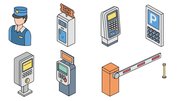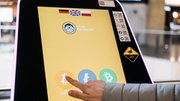News
IBM unveils initiative to help companies improve service to consumers
September 24, 2007
ARMONK, N.Y. —IBM Corp.has announced a new initiative designed to help businesses across multiple industries connect to today's technology-savvy consumer, who — according to a new IBM survey — is increasingly self-sufficient.
As part of the IBM Consumer Services Initiative, the company is delivering new technologies and services, including a self-service kiosk with built-in wireless capabilities and 3-D imagery, a new line of point-of-sale and self-checkout systems and a services practice focused on delivering customer-facing solutions.
IBM also introduced the Self Service Alliance, a program intended to drive innovation and create new uses for self-service technologies through collaboration and standards-based technologies.
As part of its ongoing consumer research efforts, IBM detailed results of a U.S. consumer survey that showed 50-percent growth in the use of self-service technology in the past year, with 70 percent of respondents saying they expect businesses to offer more self-service options. Among the 1,000 people surveyed, the most stated reasons for using self-service were access to information and services outside of normal business, less time standing in line, ease-of-use and greater privacy for certain transactions.
"Consumer expectations have accelerated rapidly over the past 10 years — like no other time in history, with no sign of a slow down in sight," said Steve Ladwig, general manager, IBM Retail Store Solutions. "Consumers are demanding even greater flexibility and choice, creating opportunities for companies of all sizes to innovate and change the way consumers connect, interact and transact business. This new generation of standards-based kiosks and self-checkout technologies will enable Business Partners to develop entirely new applications and create new connections between businesses and consumers. The future possibilities for self-service technologies are endless."
One of the first products of this global initiative is the new compact self-service kiosk product line with built-in wireless capabilities and an industry-first 19-inch screen. The IBM AnyPlace Kiosk wireless capability allows it to be deployed quickly and easily in almost any environment. Enabled by a wireless cellular WAN card from Sprint or other third-party wireless providers, consumers can connect to the Internet via kiosks inside stores, airports, hotels and more, significantly increasing their options by blending online experiences with the in-person experience.
The IBM AnyPlace Kiosk product family also includes 17-inch and 15-inch models, offering customers instant access to information, innovative services and online commerce with dual video support capabilities such as digital signage. With a rich multimedia format that includes full-motion video, high-quality audio, realistic 3-D graphics and advanced infrared touchscreen technology, these kiosks offer businesses an even greater opportunity to help influence consumer decisions and increase employee productivity without requiring additional real estate. In line with the IBM Green IT initiative, the new systems are powered by AMD high-performance, low-power Mobile Sempron and Turion dual-core processors.
As part of the IBM AnyPlace product line, IBM also introduced its first point-of-sale (POS) system capable of operating as a kiosk, point-of-sale terminal or both. As with the IBM AnyPlace Kiosk, all AnyPlace units feature integrated wireless, optional WAN and a range of integrated touchscreens, including 15- and 19-inch sizes.
Another focus area of this global initiative is the new IBM Self Checkout system, which includes software for control and flexibility when deploying self-checkout. The new IBM Checkout Environment for Consumer-Service offers retailers a complete application and toolkit for customization that opens up opportunities for the IBM Business Partner network to customize, sell and implement IBM Self Checkout solutions.
IBM is a leader in providing self-service kiosks to hotels and airlines, making it a leader in helping clients provide consumers with more choices than any other vendor for check-in and other business transactions.
"In the past, consumers were typically passive participants in health care. They'd visit their doctor once a year, obtain measurements and hope they were healthier than the year before," said Andrew Pelosi, Virgin Life Care vice president of marketing and consumer engagement. "Today, as employers share the burden of rising health-care costs, consumers are looking for ways to take control of their health. The HealthZone allows them to do this by providing immediate access to validated health data that can be used to set goals, track progress and make educated decisions to live healthier lives."
 ChatGPT
ChatGPT Grok
Grok Perplexity
Perplexity Claude
Claude









